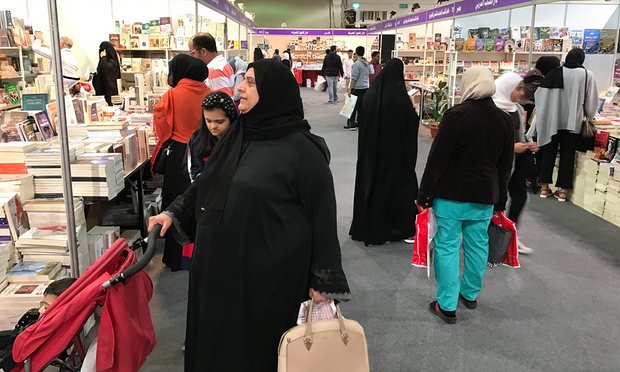Many Arab book fairs have been a free space for publishers to sell titles banned in shops, but Kuwait has seen raised levels of censorship – turning the book trade into a risky business
Arab book fairs are like a giant travelling circus; no sooner does one end than publishers are boxing up books, pulling down posters, and moving their wares to the next. There are more than 15 major fairs across the region, with dozens of minor ones. This week, a reported 568 publishers are at the Kuwait international book fair, where readers, publishers, and writers are fighting back – and winning small gains – against a growing censoriousness.
“With the exception of the Kuwait fair,” longtime Lebanese publisher Hassan Yaghi said just before the event began last week, “all the other fairs, including those in Saudi Arabia, allow a wide expanse of freedom for publishers and readers.”
These travelling book souks, which usually last around 10 days, began popping up a half-century ago, led by the giant Cairo fair. The decline of Cairo’s fair and the rise of ebooks, pirated PDFs, and bookstore chains would seem to make fairs obsolete. Yet, while their centre of gravity has shifted, they remain vibrant.
But the Kuwait fair is a strange case. It’s held in a country with a robust appreciation for literature, tough-minded writers, and strong cultural infrastructure – yet, a restrictive censorship law and political bureaucracy constantly threatens literary life.
Bestselling Kuwaiti author Bothayna al-Essa has been one of the most vocal in organising anti-censorship forces, recently giving a speech before Kuwait’s parliament and sharing her thoughts on Twitter. According to Al-Essa, the problem started with a battle over controversial books in 1998, which resulted in political turmoil. Since then, books have been used by politicians to score political points; in the last 10 years, Al-Essa says, “the Ministry of Information has committed a literary massacre,” by banning many Kuwaiti authors from sale.
Al-Essa’s 2015 novel Wandering Maps was published in Lebanon and banned from last year’s Kuwaiti fair. She says the book was banned because of a scene depicting child molestation. But a book being banned doesn’t mean demand disappears. “It’s sold under the table,” Essa said, “exposing the sellers to danger, as though they were selling hash and heroin to secondary-school students.”
Other books have been banned on an even flimsier basis: The Taste of the Wolf(2016) by Abdullah al-Busais was banned because it contains words like “pee,”, according to al-Essa, while his previous novel, Stray Memories was also banned. The comic novel Mama Hissa’s Mice (2015), by International prize for Arabic fiction-winning author Saud Alsanousi, was banned for allegedly harming public order.
Al-Essa blamed the strong censorship of the last two decades on the lack of effective political opposition in Kuwait. “Until now, liberal and secular groups have been unable to organise their ranks and provide a clear and direct narrative,” she said.
Censorship in Kuwait creates problems not just for Kuwaiti writers and readers, but also for Arab booksellers, who’ve already been hit hard by the loss of readers in Iraq and Syria, as well as the economic crisis in Egypt.
Sherif-Joseph Rizk, head of the Cairo branch of publisher Dar al-Tanweer, is currently in Kuwait for the fair. “It’s a very important market because of the high readership,” Rizk said. “Even though it’s a small population, the percentage of readers is high and disposable income is also high.”
Since this year’s Kuwaiti fair opened, publishers have been optimistic. Rizk said that he had seen several books that would typically be banned allowed this year, because the censors had been changed to “more reasonable” people. He was surprised that controversial books, like Shukri al-Mabkhout’s novel The Italian, and the Arabic translations of George RR Martin’s Game of Thrones novels were on sale (they do, however, remain banned from stores).
Publishers take a risk by participating in Kuwait, Yaghi said, because book stock can be held by censors. “Nevertheless, we insist on participating, and not only because of the economic realities,” he said. “We don’t want to submit to this situation, which we hope will change in a country where freedom has always had a wide berth.”
It’s unlikely that censorship will entirely disappear. But the organisation Sout al-Kuwait (Voice of Kuwait) is lobbying the country’s Ministry of Information in hopes of reform, and change does seem to be afoot.


